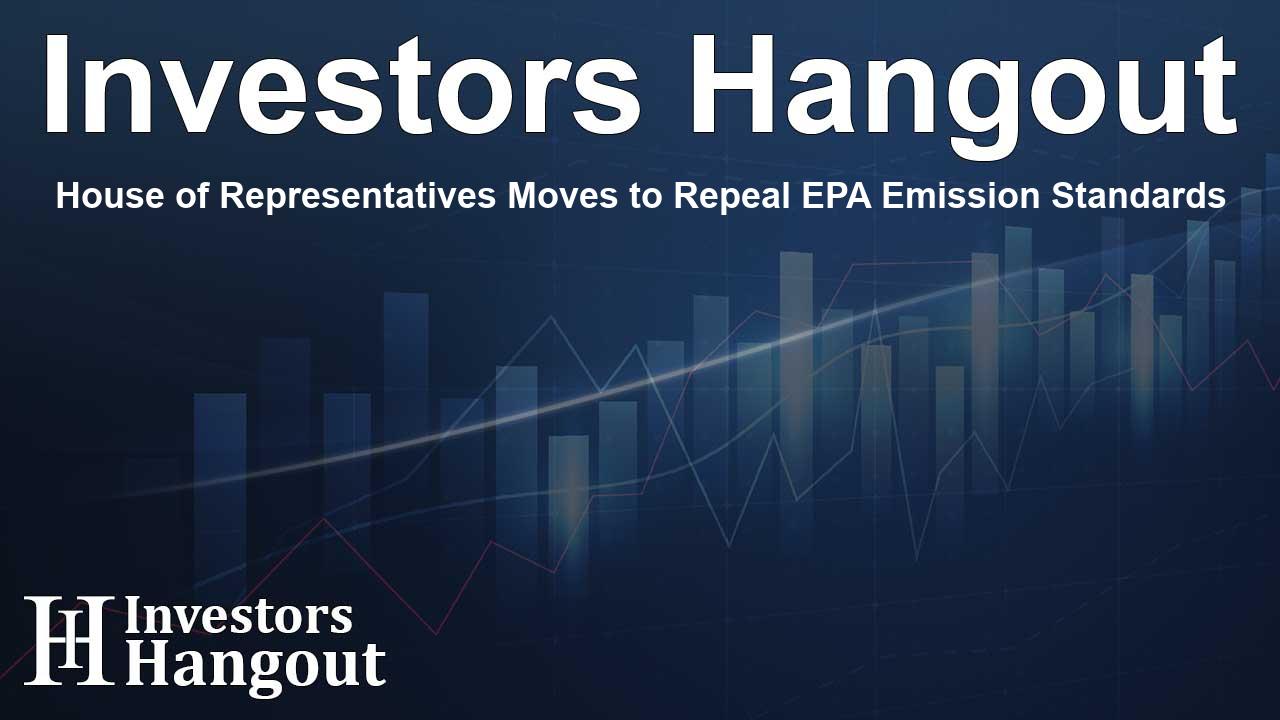House of Representatives Moves to Repeal EPA Emission Standards

House of Representatives Takes Action Against EPA Regulations
The recent vote in the U.S. House of Representatives against the Environmental Protection Agency's emission regulations marks a significant moment in the ongoing debate about environmental policies. The house narrowly voted to repeal rules aimed at reducing fleetwide tailpipe emissions by 50% compared to the levels in 2026, targeting a shift toward cleaner vehicles by the year 2032.
Understanding the Implications of the Repeal
House Republicans expressed strong concerns that implementing these strict regulations would make it challenging, if not impossible, for gas-powered vehicles to thrive in the market. Their arguments point to potential negative impacts on car manufacturers and consumers relying on traditional vehicles as a means of transportation. Such changes could drastically alter the automotive landscape across the nation.
The White House Response
In response to this legislative move, the White House has voiced its intention to oppose the repeal. Officials emphasized that President Joe Biden stands ready to veto this measure should it advance through the Senate. This stance highlights the administration's commitment to pursuing aggressive climate policies and promoting the transition to electric and hybrid vehicles.
The Broader Context of Emission Regulations
This legislative action occurs amid a growing movement toward environmental reform and sustainable practices. Many states and municipalities are already implementing their own emission standards, aimed at reducing the overall carbon footprint of transportation. These initiatives reflect a broader societal shift towards renewable energy and climate responsibility.
Cultural and Economic Impact
The implications of the repeal extend beyond environmental considerations. It raises questions about the future of jobs in the automotive sector, particularly in electric vehicle production and technology development. While some argue for the preservation of traditional jobs, others advocate for the need to prepare for an evolving marketplace that prioritizes sustainability and innovation.
What's Next for U.S. Emission Standards?
As the situation develops, the focus will likely shift to the Senate and any potential compromises or amendments that could arise during deliberations. The relationship between environmental policies and economic stability remains a contentious point of discussion among lawmakers and constituents alike. Both sides aim to balance immediate economic needs with long-term environmental goals.
The Role of Public Opinion
The actions of the House resonate with public sentiment regarding environmental regulation. Many citizens advocate for stricter controls on emissions, driven by growing concerns about climate change and public health. As awareness rises, the pressure on lawmakers to enact meaningful change and legislate toward a sustainable future intensifies.
Conclusion: A Divided Legislative Landscape
The vote signals a crucial moment in U.S. environmental legislation, showcasing the divisive nature of climate policy in contemporary politics. The outcomes in the Senate and the White House’s potential veto will be pivotal in shaping the nation’s regulatory framework concerning emissions and climate change initiatives.
Frequently Asked Questions
What was the main goal of the EPA's regulation?
The EPA aimed to cut fleetwide tailpipe emissions by 50% from the 2026 levels by 2032, promoting cleaner vehicle technology.
What was the response from the House Republicans?
House Republicans argued that these regulations would effectively make gas-powered vehicles obsolete in the market.
What can we expect from the White House?
The White House has indicated that President Joe Biden would veto the repeal if it passes in the Senate, reinforcing the administration's commitment to environmental policies.
How do state regulations affect the situation?
Many states have already enacted their own emission standards, which contribute to the ongoing discourse about environmental responsibility and sustainability.
What does public opinion reflect regarding emission regulations?
Public sentiment appears to support stricter emissions policies, driven by widespread concerns about climate change and its health impacts.
About Investors Hangout
Investors Hangout is a leading online stock forum for financial discussion and learning, offering a wide range of free tools and resources. It draws in traders of all levels, who exchange market knowledge, investigate trading tactics, and keep an eye on industry developments in real time. Featuring financial articles, stock message boards, quotes, charts, company profiles, and live news updates. Through cooperative learning and a wealth of informational resources, it helps users from novices creating their first portfolios to experts honing their techniques. Join Investors Hangout today: https://investorshangout.com/
Disclaimer: The content of this article is solely for general informational purposes only; it does not represent legal, financial, or investment advice. Investors Hangout does not offer financial advice; the author is not a licensed financial advisor. Consult a qualified advisor before making any financial or investment decisions based on this article. The author's interpretation of publicly available data shapes the opinions presented here; as a result, they should not be taken as advice to purchase, sell, or hold any securities mentioned or any other investments. The author does not guarantee the accuracy, completeness, or timeliness of any material, providing it "as is." Information and market conditions may change; past performance is not indicative of future outcomes. If any of the material offered here is inaccurate, please contact us for corrections.